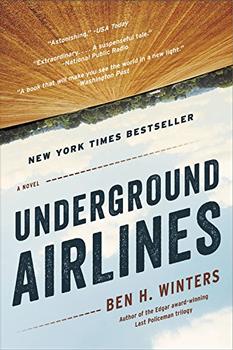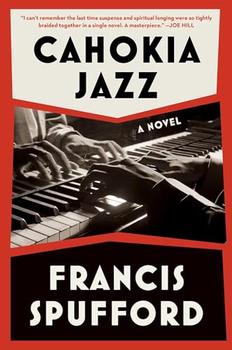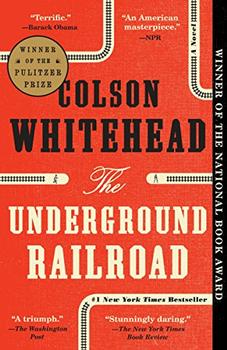Summary | Excerpt | Reviews | Beyond the book | Read-Alikes | Genres & Themes | Author Bio

Ben Winters imagines a different history for the United States in Underground Airlines by changing the time of a single precipitous event: the assassination of Abraham Lincoln. In Winters's alternate history there was no Civil War, and Lincoln's assassination in Indianapolis on the way to his inauguration was "the martyrdom that saved the union." His death sparked a political compromise. The United States remained a union, but one with slave states and slavery-tolerating states, a situation similar in some respects to the U.S. circa 1850, where the escape of a slave to a free state did not guarantee freedom. Blood was shed, though – a "long and brutal Texas War" dwindled the number of slave states down so that today there are just the "Hard Four."
Where there is slavery, there must be escapees, or runners. And where there are runners, there must be pursuers, or soul-catchers. Told in the present-day, Victor, born a slave, works now as a soul-catcher in the employ of the U.S. Marshal's Service which enforces the Fugitive Persons Law. It's an interesting world Victor roams. Euphemisms and acronyms disguise ugliness. Slaves are "Persons Bound to Labor (PBLs)". The U.S. has an Internal Border and Regulations Department to control traffic into and from the Hard Four. The non-slave holding U.S. has a Clean Hand Law to control imports of slave-made goods. There's also a Conference of Slave Holding Organizations, and thousands of slaves – PBLs – work for mega-corporations like Garments of the Greater South, Inc. (GGSI), in Orwellian self-contained facilities.
Victor narrates the story, which unfolds at a readable pace, focused by knots of tension. His latest assignment is to pursue Jackdaw, an escapee from GGSI. In Indianapolis, Victor approaches a Catholic priest thought to be an agent of the Underground Airline (a modern-day version of the Underground Railroad.) From there, Victor descends into a labyrinth of intrigue and duplicity, a narrative highlighting more than one nuanced character – the pale, quiet Catholic priest has a different personality than his appearance suggests; Martha, an anxious, demanding young woman; her son Lionel, a young child born after a love affair with an escaped slave; and Victor's supervisor, Bridge, "cold and unbending like iron, with a hint of a southern accent coming up off his voice like the whisper of smoke from a gun barrel." There are also flashbacks to Victor's youth as a child PBL in a slaughtering plant.
Winters creates a complex and compelling character in Victor. He is self-aware, but closed off; bitter behind a bland façade. But he is also an insightful man, one growing in empathy for the PBLs and in his comprehension of the capacity for evil within good men. The latter becomes evident, not so much in Victor's search for Jackdaw, but later when he stumbles on material that will expose a Hard Four program more evil than slavery.
Winters's portrait of Indianapolis, where most of the action of Underground Airlines occurs, is fascinating, especially when he uses the weather and depressed neighborhoods to reflect the ugliness of slavery and the ambivalence of Victor's mindset. The novel is full of allegory and symbolism – and irony too - for instance, Texas and its Hispanic population break away from the U.S. because of slavery. Through these literary devices, Winters also explores how a faceless corporate oligarchy can warp the social and economic progress of the U.S.; the hypocrisy of international relations; and implicit segregation driven by racial prejudice. There's a mention of FDR in this intriguing alternate history, and some minor discussion of foreign perception of slavery influencing trade and other factors, but Winter avoids delving into the influence of slavery on world-changing events like the World Wars, Korea, Vietnam and the Cold War, and the Great Depression.
Fans of alternate history will want this for their libraries. Those new to the genre could find no better book to explore the concept.
![]() This review was originally published in The BookBrowse Review in July 2016, and has been updated for the
August 2017 edition.
Click here to go to this issue.
This review was originally published in The BookBrowse Review in July 2016, and has been updated for the
August 2017 edition.
Click here to go to this issue.

If you liked Underground Airlines, try these:

by Francis Spufford
Published 2024
From "one of the most original minds in contemporary literature" (Nick Hornby) the bestselling and award-winning author of Golden Hill delivers a noirish detective novel set in the 1920s that reimagines how American history would be different if, instead of being decimated, indigenous populations had thrived.

by Colson Whitehead
Published 2016
From prize-winning, bestselling author Colson Whitehead, a magnificent tour de force chronicling a young slave's adventures as she makes a desperate bid for freedom in the antebellum South






Your guide toexceptional books
BookBrowse seeks out and recommends the best in contemporary fiction and nonfiction—books that not only engage and entertain but also deepen our understanding of ourselves and the world around us.